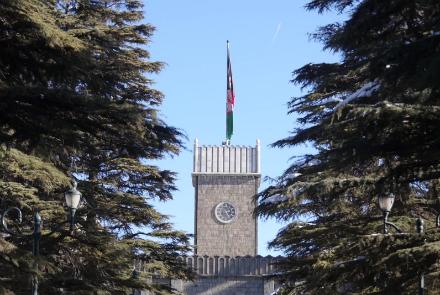The Office of Chief Executive Abdullah Abdullah in a statement on Monday stated that the Supreme Court’s decision on President Ashraf Ghani’s tenure means the extension of tenure of the National Unity Government – which is the outcome of an agreement between Ghani and Abdullah signed following controversial elections in 2014.
The Supreme Court on Sunday, April 21, approved the extension of Ghani’s tenure until the upcoming presidential elections scheduled for September 28, while according to the Constitution, the incumbent government’s tenure ends on May 22.
“The incumbent government in Afghanistan is the National Unity Government which has been formed by the two leaders (Ghani and Abdullah),” said Faraidoon Khozoon, a spokesman for Abdullah’s office. “The chief executive (Abdullah Abdullah’s) tenure will continue until the president’s (Ashraf Ghani) tenure continues. And the president’s tenure will continue until the chief executive’s tenure continues.”
Abdullah, who addressed the Council of Ministers meeting on Monday, did not mention anything about the issue and headed the meeting by discussing usual governance-related matters.
In recent years, the way the government has interpreted Afghanistan’s Constitution over different occasions has led to controversies among political elites and ordinary Afghans. Legal experts said that in most cases, the Constitution has been interpreted according to involved parties’ “interests”.
“The Constitution of Afghanistan has given the authority of its interpretation to a legitimate government,” a legal expert Wahid Farzaee said. He added that the new interpretation of the Constitution – on the extension of Ghani’s tenure – does not own such a condition, therefore, he said it cannot be acceptable from a legal point of view.
Some Kabul residents, meanwhile, said they prefer the incumbent until the upcoming elections.
“There will be ‘anarchy’ in absence of the incumbent government and there will be a power gap. The continuation of the incumbent government until elections is a better option,” said Matin Ishaqzai, a Kabul resident.
“An interim government will not have any good outcome for Afghanistan,” Mohammad Shafi, a Kabul resident.
Two presidential candidates on Sunday described the court’s decision in defiance to the spirit of the law and accused President Ghani of “suppressing” democracy.
“It is a political decision,” said Faramarz Tamanna, a presidential candidate. “It is a decision which was taken on the demand of the Afghan government.”
“First of Jawza (May 22) is a crucial issue. I hope that the government opens a wider debate on it so that we can have a political solution to the matter,” said Shaida Mohammad Abdali, a presidential candidate.
This comes as President Ghani has reiterated in many occasions that he will not remain in the power “even one day after his legal tenure ends”.


